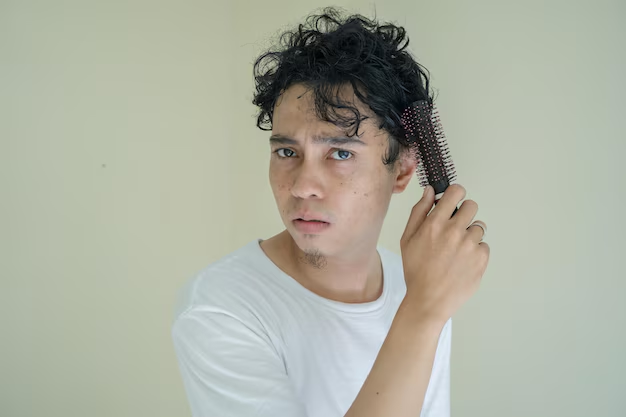Hair Thinning in Teenage: How to Treat It
Hair Thinning in Teenage: How to Treat It
Struggling with hair thinning in teenage years? Get expert tips and treatments from Chennai’s trusted dermatologists at Dr. Hanan Clinic.

Hair thinning in teenage years is becoming increasingly common, especially due to modern lifestyle habits, nutritional gaps, stress, and hormonal changes. While it’s natural to lose a few strands daily, excessive hair fall or visible thinning at a young age can be distressing. At Dr. Hanan Dermatology Speciality and Trichology Clinic, Chennai, we see many teens facing this issue and provide tailored treatment plans based on in-depth diagnosis.
In this blog, we’ll explore the causes of teenage hair thinning, how to spot early signs, effective treatments, and expert tips to regain hair health safely.
In this blog, we’ll explore the causes of teenage hair thinning
Why Is My Hair Thinning as a Teenager?
Hair thinning during adolescence can be due to several reasons—some reversible, some needing long-term management. The key is early diagnosis.
Common Causes of Hair Thinning in Teenagers:
- Hormonal Changes
Puberty brings a surge in hormones like androgens, which can disrupt the hair growth cycle and cause thinning in both boys and girls. - Nutritional Deficiencies
Low levels of iron, zinc, protein, biotin, or vitamin D can significantly impact hair health. - Stress and Mental Health
Academic pressure, social anxiety, or emotional issues can trigger Telogen Effluvium, a stress-induced form of hair loss. - Poor Diet or Crash Dieting
Skipping meals, extreme calorie deficits, or eating mostly junk food can deprive hair follicles of essential nutrients. - Genetics (Androgenetic Alopecia)
If one or both parents have pattern baldness, it may begin early, especially in males. - Over-Styling and Heat Damage
Constant use of straighteners, curling rods, or tight hairstyles damages hair shafts and roots. - Underlying Medical Conditions
Conditions like PCOS, thyroid imbalance, or autoimmune disorders like alopecia areata may be the root cause.
Related Link: Learn more about Types of Hair Loss and Their Treatments
How to Know If You Have Hair Thinning as a Teen?
Recognizing the early signs of hair thinning is essential for timely treatment.
Early Signs Include:
- A widening parting or receding hairline
- More hair on pillow, comb, or shower drain
- Scalp visibility through the hair
- Hair feeling thinner or lighter than usual
- Reduced ponytail thickness (for girls)
Can Hair Thinning in Teenagers Be Reversed?
Yes—most types of hair thinning in teenagers can be reversed if treated early and correctly. The approach may include medical treatment, lifestyle changes, and professional care under a dermatologist.
Symptoms: Patchy hair loss, broken hairs, and thinning. Most common in adolescents and young adults.
Management: Behavioral therapy, psychological support, and dermatological care.
Best Treatments for Hair Thinning in Teenage
At Dr. Hanan Clinic, we customize hair loss treatment based on the patient’s age, diagnosis, severity, and medical history.
1. Topical Treatments
Mild topical solutions like minoxidil (in low strength) may be used under medical supervision to stimulate hair follicles and improve density.
2. Nutritional Therapy
We prescribe supplements containing biotin, iron, zinc, and amino acids to restore internal imbalances. Diet counseling is often part of the treatment.
3. PRP Therapy for Teens
Platelet-Rich Plasma (PRP) therapy is a safe, non-surgical treatment that uses your own blood’s growth factors to stimulate hair regrowth. It’s becoming a popular option even for young patients with early signs of androgenetic alopecia.
4. Low-Level Laser Therapy (LLLT)
This painless treatment boosts blood circulation in the scalp and revitalizes weak hair follicles.
5. Microneedling
For early-stage thinning, microneedling combined with hair serums can help increase scalp absorption and rejuvenate follicles.
What Not to Do If You're a Teen Experiencing Hair Loss
- Don’t self-medicate with strong OTC hair loss products
- Avoid using adult-strength minoxidil or oral finasteride without a prescription
- Don’t follow viral trends (on TikTok, YouTube, etc.) without expert advice
- Avoid stress-induced pulling or tugging of hair (Trichotillomania)
Expert Tips to Prevent Hair Thinning in Teenagers
- Eat a balanced diet with protein, leafy greens, and healthy fats
- Wash your scalp 2–3 times a week with a gentle, sulfate-free shampoo
- Avoid tight hairstyles like ponytails or buns
- Stay hydrated and get 7–8 hours of sleep
- Incorporate relaxation methods like yoga or journaling to manage stress
When to See a Dermatologist for Hair Thinning
Visit a specialist if:
- Hair thinning has continued for more than 2–3 months
- You have a family history of baldness
- You notice bald patches or scalp inflammation
- You are experiencing emotional distress due to hair changes
At Dr. Hanan Dermatology Speciality and Trichology Clinic, our dermatologists use trichoscopy, blood tests, and clinical evaluation to diagnose the exact reason for your hair thinning. This enables us to design a personalized, teen-friendly treatment plan.
Explore Treatments: Hair Regrowth Treatments in Chennai
Final Thoughts: Hair Thinning in Teenage Is Treatable
While hair thinning in teenage years can feel overwhelming, the good news is that it’s usually reversible with timely care. Whether the root cause is stress, poor nutrition, or hormonal changes, you don’t have to face it alone.
Our team at Dr. Hanan Clinic in Chennai has helped hundreds of teens regain confidence and fuller, healthier hair. Early consultation and a customized plan are the keys to long-term hair wellness.
Book Your Consultation Today!
Table of Contents
Can Stress Cause Hair Loss? Dermatologists Tips
Can Stress Cause Hair Loss? Dermatologists Tips
Can stress cause hair loss? Learn what top dermatologists in Chennai say about the link between stress and hair fall, types, treatments, and recovery tips.

Why Seasonal Skin Care Matters in Chennai
Hair loss is a concern that affects millions globally, and one common but often overlooked cause is stress. In a city like Chennai, where fast-paced lifestyles, work pressure, and environmental changes are constant, stress-related hair fall is becoming increasingly common. At Dr. Hanan Dermatology Speciality and Trichology Clinic, our dermatologists frequently treat patients whose hair loss is directly or indirectly triggered by stress.
In this blog, we’ll explore the scientific link between stress and hair loss, the different types of hair fall caused by stress, symptoms to watch out for, and expert treatment options available in Chennai.
How Does Stress Cause Hair Loss?
Stress affects the body in multiple ways—and your scalp and hair follicles aren’t spared. When the body undergoes emotional or physical stress, it can disrupt the normal hair growth cycle. This disruption leads to excessive shedding, thinning, or even hair loss in patches.
Chronic stress can trigger hormonal imbalances, reduce blood flow to the scalp, and elevate levels of cortisol (the stress hormone), all of which negatively affect hair health. Inflammation caused by stress can also damage the hair follicles and slow down hair production.
Studies have shown that stress can impact the anagen (growth) phase of the hair cycle, causing more hairs to shift into the telogen (resting) phase prematurely. This leads to a noticeable increase in hair fall within a few months of the stressful event.
Types of Stress-Related Hair Loss
There are three main types of hair loss that are scientifically linked to stress:
Telogen Effluvium
This is the most common form of stress-induced hair loss. During Telogen Effluvium, a large number of hair follicles prematurely enter the resting phase (telogen), causing increased shedding.
Symptoms: Noticeable hair fall while combing, washing, or on your pillow.
Triggers: Sudden illness, high fever, emotional trauma, childbirth, or crash diets.
Recovery: Usually resolves in 3–6 months once the stressor is removed.
Alopecia Areata
This is an autoimmune condition where the immune system attacks hair follicles, often triggered by extreme stress.
Symptoms: Sudden hair loss in round patches, usually on the scalp. In some cases, it may affect eyebrows or beard.
Triggers: Emotional stress, family history, autoimmune disorders.
Treatment: Corticosteroids, immunotherapy, and stress management.
Trichotillomania
This is a psychological condition where a person feels the urge to pull out their hair due to anxiety or emotional distress.
Symptoms: Patchy hair loss, broken hairs, and thinning. Most common in adolescents and young adults.
Management: Behavioral therapy, psychological support, and dermatological care.
Expert-Backed Treatments in Chennai
At Dr. Hanan Dermatology Speciality and Trichology Clinic, we offer specialized diagnostics and treatment plans for stress-induced hair loss:
- PRP (Platelet-Rich Plasma) Therapy: Promotes growth by stimulating hair follicles and increasing scalp health.
- Minoxidil and Topical Serums: Helps prolong the growth phase of hair and reduce shedding.
- Hair Regrowth Supplements: Targets internal deficiencies caused by stress, including biotin, zinc, and vitamin D.
- Laser Therapy for Scalp: Improves blood circulation and strengthens follicles.
- Counseling and Stress Management Referrals: For cases linked with anxiety or depression, we refer you to our in-house mental health experts.
We believe in combining internal wellness with external treatment for holistic hair recovery.
How to Prevent Stress-Related Hair Loss
Practice Regular Relaxation Techniques: Yoga, meditation, and breathing exercises have been shown to lower cortisol levels.
Sleep Well: Aim for 7–8 hours of sleep every night to help the body repair and regenerate.
Maintain a Balanced Diet: Include foods rich in iron, protein, omega-3 fatty acids, and antioxidants.
Avoid Over-Styling and Harsh Products: Reduce the use of flat irons, harsh dyes, and chemical treatments.
Stay Hydrated: Water supports scalp health and nutrient delivery to follicles.
When to See a Dermatologist
If you’re experiencing sudden, excessive hair loss or patchy bald spots, don’t wait. The earlier the diagnosis, the more effective the treatment. At Dr. Hanan Clinic, we perform detailed scalp analysis, trichoscopy, and blood tests to identify the root cause.
Our dermatologists then customize a treatment plan to not only stop the hair loss but also encourage healthy regrowth.
When to See a Dermatologist
Stress-related hair loss is more common than most people realize, especially in a high-stress environment like Chennai. The good news? With expert guidance and timely treatment, most people can fully recover and enjoy healthy hair once again.
If you’re concerned about hair thinning or sudden shedding, visit Dr. Hanan Dermatology Speciality and Trichology Clinic. We’ll help you identify the cause, relieve your stress, and restore your confidence—one strand at a time.
Frequently asked Questions
Yes. In most cases, once the stressor is removed and the body returns to a balanced state, hair often begins to regrow. Treatments like PRP and topical solutions can accelerate this recovery. Learn more about PRP Treatment for Hair Loss in Chennai.
Depending on the type and severity, stress-related hair loss may last from 3–6 months. Recovery depends on early intervention and proper treatment. Find solutions through our Hair Regrowth Treatments in Chennai.
Sudden, diffuse hair shedding after a stressful event (like illness, surgery, or emotional trauma) is a strong indicator. A dermatologist can confirm this through scalp examination and history. Consider reading Hair Fall While Combing: Best Ways to Minimize It.
In most cases, stress-related hair loss is temporary. However, chronic stress or delayed treatment can worsen underlying conditions and prolong recovery. For further understanding, see Hair Transplant Pain: What Should You Expect?.

